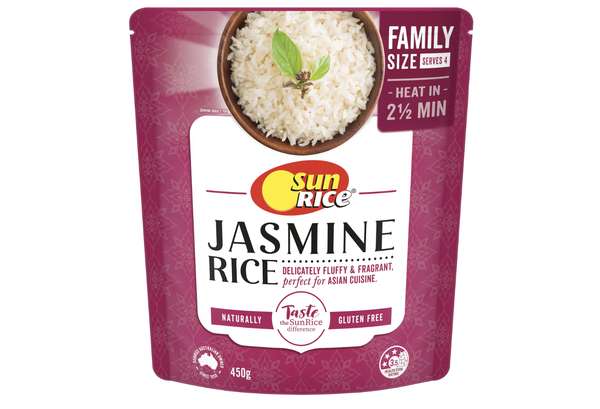When we think of convenience foods, instant rice is often a staple in many Australian households, offering a quick and easy side dish for busy families. However, one mother’s recent experience with a popular instant rice brand turned from convenient to revolting in a matter of seconds.
The mother, who was preparing a meal for her children, was horrified when she opened a packet of SunRice’s 90 Second Jasmine Rice, only to find the contents were anything but the ‘fluffy and fragrant rice’ she was expecting.
Instead, she was greeted by hardened rice covered in a sickening display of yellow and black mould.

Understandably, the mother was on the verge of being sick, especially considering she was about to serve it to her children. Expressing her shock and disgust at the discovery, the mother revealed that she nearly vomited. The product, which was well within its expiry date of November 2025, should have been safe to consume.
This incident raises concerns about food safety and quality control in the food industry, particularly for products that are marketed as quick and convenient.
SunRice, also known as Ricegrowers Limited, is a major player in the Australian rice market, exporting to over 60 countries and responsible for pooling all rice grown in Australia, predominantly in the NSW Riverina region.
In response to the mother’s complaint, SunRice provided an explanation that mould can develop if the packaging is compromised during transit or storage, allowing oxygen to enter and create an environment where mould can thrive. They mentioned that even a tiny pinhole or a piece of rice caught in the seal during manufacturing could lead to a lack of seal integrity and subsequent mould growth.
While the mother received a ‘long-winded response’ and a $10 voucher from SunRice, the situation raised questions about the quality control of such staple products.
‘The quality of our products is our highest priority, and we take quality assurance testing seriously. Every batch of our SunRice Jasmine rice goes through robust testing, including seal integrity checks and thermal processing checks. Thermal processing helps ensure the food safety of microwave rice pouches,’ said a spokesperson.
‘Any batch that does not meet the minimum standard of time and temperature of cooking is rejected. Once packaged, further testing is conducted for sensory and microbial assessment.’
However, without further information, they could not comment directly on this specific case but did offer an apology to the customer.
The recent changes in NSW government legislation aimed at increasing competition in the rice industry may have implications for quality control. The legislation, which came into effect on September 1, allows rice crops from areas such as the Northern Rivers to be sold into domestic and international markets without restriction. Minister for Agriculture Tara Moriarty highlighted the government’s efforts to listen to rice growers and industry requests, aiming to make it easier to get NSW rice into global markets.
Have you ever encountered an issue with pre-packaged or convenience foods? We’d love to hear your experiences in the comments below. Let’s discuss how food safety and quality control impact our everyday choices.
Also read: Mouldy food: Should you cut it out or throw it out?


About 25 or so years ago, I wondered what was the hard thing I chewed on in my muesli. It was a staple and I consider myself very lucky that I had not swallowed it as it may have been the equivalent to a chicken bone in my throat – and I was by myself in an isolated house.
On contacting the mueslie manufacturer I found them to be very apologetic. As well they said they would investigate it.
Next I had their agent phone me to ask for my location as he was bringing me a box of their products. The poor bloke spent a couple of hours driving along the rural roads and doing as numerous others had done, couldn’t locate me. He had phoned a couple of times along the way. Eventually from back in town he phoned and offered to come out to find me the next day to which I responded to not worry about it. He wasn’t the first or last to have this problem as some tradies have had similar experiences and even some friends. Nowadays, with GPS the problem barely exists.
The muesli company also kept me informed about their research. They had experimented with their system that was thought to be fail-safe in that it was supposed to detect any foreign objects in the packages of their products and were shocked to find that it missed objects such as staples they had deliberately put into packages. The next letter gave me information about their new system they had installed. They believed it was much better than the one that had let the offending staple through and was passing their tests on it.
Full marks to them for their response and follow ups.